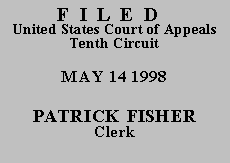

| RODNEY FRANCIS KING,
Plaintiff-Appellant, v. LARRY FIELDS; DELORES RAMSEY; JOHN MIDDLETON; DAVID ARNEECHER, Defendants-Appellees. |
|
Plaintiff Rodney Francis King brought this action under 42 U.S.C. § 1983 claiming defendants violated his right to due process in prison disciplinary proceedings. The district court granted summary judgment in favor of defendants, and plaintiff appeals. We review the district court's grant of summary judgment de novo. See Kaul v. Stephan, 83 F.3d 1208, 1212 (10th Cir. 1996). Summary judgment is appropriate if there are no disputed issues of material fact and the moving party is entitled to judgment as a matter of law. See id.
A correctional officer discovered plaintiff and another inmate in a toilet stall. The officer's incident report stated that the other inmate was sitting on the toilet, plaintiff was standing in front of him with his pants open, and they had been engaging in oral sex. Plaintiff was charged with misconduct for engaging in sexual activity, and he received notice of the offense report and of the scheduled disciplinary hearing. Plaintiff's defense at the hearing was that he had not been engaging in oral sex with the other inmate, but instead, had been discussing a drug transaction with the inmate. The disciplinary hearing officer found plaintiff guilty of the offense, citing as the basis for his finding the correctional officer's "statement that I/M King and Cook were engaging in oral sex." R. Doc. 18, Att. B at 1. Plaintiff's administrative appeals were denied.
In Wolff v. McDonnell, 418 U.S. 539 (1974), the Supreme Court held that prisoners must be accorded due process in certain prison disciplinary proceedings. Disciplinary proceedings meet Wolff's due process requirements if they provide the inmate with "(1) advance written notice of the disciplinary charges; (2) an opportunity, when consistent with institutional safety and correctional goals, to call witnesses and present documentary evidence in his defense; and (3) a written statement by the factfinder of the evidence relied on and the reasons for the disciplinary action." Mitchell v. Maynard, 80 F.3d 1433, 1445 (10th Cir. 1996) (internal quotation omitted). Plaintiff contends that the statement defendants provided did not satisfy the third Wolff requirement. We agree with the district court that while the statement was brief, it adequately informed plaintiff of the evidence the factfinder relied on and the reason for the disciplinary action. The charge was not complex, and the evidence was limited. As the Seventh Circuit said in a similar situation, "there is no mystery about [the factfinder's] reasoning process, despite the extreme brevity of its statement of reasons, [and] that statement is not so deficient as to create error of constitutional magnitude." Saenz v. Young, 811 F.2d 1172, 1174 (7th Cir. 1987); see also Brown v. Frey, 807 F.2d 1407, 1412 (8th Cir. 1986).
We also reject plaintiff's contention that the statement of reasons was inadequate because it failed to explain why the factfinder found the correctional officer more credible than plaintiff, as plaintiff contends is required by state rules and procedures. Any violation of state rules or procedures here did not rise to constitutional dimension implicating due process concerns. Finally, we reject plaintiff's contention that evidence he submitted created a disputed issue of material fact regarding whether the statement of reasons was adequate. At most, that evidence showed that another conclusion by the disciplinary officer was possible, not required, but it does not raise any question regarding the adequacy of the statement.
The judgment of the United States District Court for the Western District of Oklahoma is AFFIRMED.
Entered for the Court
Circuit Judge
*. This order and judgment is not binding precedent, except under the doctrines of law of the case, res judicata, and collateral estoppel. The court generally disfavors the citation of orders and judgments; nevertheless, an order and judgment may be cited under the terms and conditions of 10th Cir. R. 36.3.